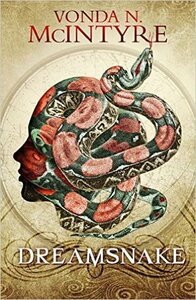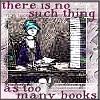Take a photo of a barcode or cover
One of the blurbs on the back from Frank Herbert describes this book as "readable", and it is just about that, in the sense that Keystone Light is "drinkable" or Taco Bell "edible." Treacly characters, flopsy world-building, and shoddy writing combine for a book that is just embarrassing. What do I mean?
In a post-apocalyptic Earth, ravaged by nuclear war and contact with aliens, Snake is a Healer who used advanced biotechnology in the form of altered snake venom to cure disease. The dreamsnake is a strange alien creature, with a mind-altering bite that brings painless death to those who cannot be cured. Crude and superstitious herders kill Snake's precious dreamsnake, and so she wanders around the wasteland helping out people and trying to find another dreamsnake. Snake is really just the best. She cares about everybody: Snake does what she can for an prospector with a broken back, teaches a nervous young man about love, saves a dying lord, rescues a child from a sexually abusive guardian, fulfills a dying wish, helps an addict, and breaks up a cult that is abusing the powers of the dreamsnake, before finding Tru Wuv. She rides a fancy racehorse when she's not riding the tiger-striped pony she genetically engineered. But Snake's not perfect: she just cares so much it makes her tired and lonely; but she'd never abuse her healing powers in the wasteland for personal benefit; and sometimes she hurts from arthritis brought on by her snake-venom-juiced immune system.
The wasteland is the nicest post-apocalypse I've seen, with honest tribes of nomads, peaceful and prosperous cities, and the right craftsman when you need one. The only hints of conflict or desperation come from Central City, the sole humans who trade with aliens who are divided into paranoid clans. Of course, Snake doesn't actually go into Central City, or interact with them beyond the gatekeeper, because conflict isn't interesting or something. By the way, accidental pregnancy (and related drama) is avoided through "biocontrol" techniques that are explained in detail during awkward sex scenes. The atomic apocalypse, the aliens, the hints of more advanced technologies and hidden schools of esoteric knowledge, seem to be cargo culted from the genre at large rather than included for any actual reason. The seemingly benevolent Healers, like Snake, limit their numbers to the scarce dreamsnakes, rather than using their "mundane" techniques like tumor-melting vipers and vaccine-producing rattlesnakes, to serve as many people as possible. Some humanitarians!
As for the writing, it is overall juvenile, and in places cringe-worthy. And even though the language is simple, it's unclear in critical descriptions of action and physicality. I found myself flipping back a page to check where people were relative to each other, and who had been shot with a crossbow, multiple times. A few nice descriptions of deserts can't save this. The idea of the dreamsnake is woefully underused. We're told Snake needs one to be a healer, but she gets on perfectly well saving lives without one for the entire novel. Compared to other Hugo stinkers, Fritz Lieber at least writes with energy, and the ponderous psuedo-intellectualism of "yeast vat accident Mark Clifton’s They’d Rather Be Right" (props to Scott Lynch) fit the scope of the topics. Dreamsnake can't even live up to it's meager ambitions.
On an interesting historical note, 4 of the 5 Hugo nominees this year were women, with Vonda McIntyre, Ann McCaffrey, C.J. Cherryh, and a withdrawn entry from James Tiptree Jr. Both McCaffrey and Cherryh submitted the third book in a trilogy, which may have hurt their chances in the voting. Neither are my favorite authors, but they have to be better than this book.
In a post-apocalyptic Earth, ravaged by nuclear war and contact with aliens, Snake is a Healer who used advanced biotechnology in the form of altered snake venom to cure disease. The dreamsnake is a strange alien creature, with a mind-altering bite that brings painless death to those who cannot be cured. Crude and superstitious herders kill Snake's precious dreamsnake, and so she wanders around the wasteland helping out people and trying to find another dreamsnake. Snake is really just the best. She cares about everybody: Snake does what she can for an prospector with a broken back, teaches a nervous young man about love, saves a dying lord, rescues a child from a sexually abusive guardian, fulfills a dying wish, helps an addict, and breaks up a cult that is abusing the powers of the dreamsnake, before finding Tru Wuv. She rides a fancy racehorse when she's not riding the tiger-striped pony she genetically engineered. But Snake's not perfect: she just cares so much it makes her tired and lonely; but she'd never abuse her healing powers in the wasteland for personal benefit; and sometimes she hurts from arthritis brought on by her snake-venom-juiced immune system.
The wasteland is the nicest post-apocalypse I've seen, with honest tribes of nomads, peaceful and prosperous cities, and the right craftsman when you need one. The only hints of conflict or desperation come from Central City, the sole humans who trade with aliens who are divided into paranoid clans. Of course, Snake doesn't actually go into Central City, or interact with them beyond the gatekeeper, because conflict isn't interesting or something. By the way, accidental pregnancy (and related drama) is avoided through "biocontrol" techniques that are explained in detail during awkward sex scenes. The atomic apocalypse, the aliens, the hints of more advanced technologies and hidden schools of esoteric knowledge, seem to be cargo culted from the genre at large rather than included for any actual reason. The seemingly benevolent Healers, like Snake, limit their numbers to the scarce dreamsnakes, rather than using their "mundane" techniques like tumor-melting vipers and vaccine-producing rattlesnakes, to serve as many people as possible. Some humanitarians!
As for the writing, it is overall juvenile, and in places cringe-worthy. And even though the language is simple, it's unclear in critical descriptions of action and physicality. I found myself flipping back a page to check where people were relative to each other, and who had been shot with a crossbow, multiple times. A few nice descriptions of deserts can't save this. The idea of the dreamsnake is woefully underused. We're told Snake needs one to be a healer, but she gets on perfectly well saving lives without one for the entire novel. Compared to other Hugo stinkers, Fritz Lieber at least writes with energy, and the ponderous psuedo-intellectualism of "yeast vat accident Mark Clifton’s They’d Rather Be Right" (props to Scott Lynch) fit the scope of the topics. Dreamsnake can't even live up to it's meager ambitions.
On an interesting historical note, 4 of the 5 Hugo nominees this year were women, with Vonda McIntyre, Ann McCaffrey, C.J. Cherryh, and a withdrawn entry from James Tiptree Jr. Both McCaffrey and Cherryh submitted the third book in a trilogy, which may have hurt their chances in the voting. Neither are my favorite authors, but they have to be better than this book.
That... was a page turner.
Not in the way a thriller is a page turner, but in the way that there's always something either happening or being revealed about the world and plot, and it just flings you page to page with curiosity.
There was something so odd about this story that I could not put my finger on, but it only added to my reading experience rather than took away from it. The ending does remind me of the structure of several short stories I have read and seeing as it was a short story before being fleshed out into a novel, it makes sense - not at all off-putting.
I'm just left with this feeling of "huh." and a positive reading experience. I don't know how else to put it. Huh.
Not in the way a thriller is a page turner, but in the way that there's always something either happening or being revealed about the world and plot, and it just flings you page to page with curiosity.
There was something so odd about this story that I could not put my finger on, but it only added to my reading experience rather than took away from it. The ending does remind me of the structure of several short stories I have read and seeing as it was a short story before being fleshed out into a novel, it makes sense - not at all off-putting.
I'm just left with this feeling of "huh." and a positive reading experience. I don't know how else to put it. Huh.
McIntyre has such a clear voice, and describes such a fully realized set of cultures. I wish I'd found her work sooner, but this book had been out of print for so long. It's a shame, since it more than deserves its Hugo and Nebula.
Snake strikes a cord in me not because of her role as healer, but in the way she is like an anthropologist, meeting up against the unknown edges of cultures that cost her her dream snake, shut her out in the deadly desert storms of winter, and revile her and the other healers for their arrogance.
McIntyre's prose carries the reader, her characters strong and distinct outgrowths of this understructure that allow her to treat on matters of sexuality with such frankness that it might feel out of place in another narrative or in the hands of of a writer less skilled.
I find myself thinking back on these images since finishing the book, longing to read more about this future world. I think it's time to trawl through McIntyre's whole body of work.
Snake strikes a cord in me not because of her role as healer, but in the way she is like an anthropologist, meeting up against the unknown edges of cultures that cost her her dream snake, shut her out in the deadly desert storms of winter, and revile her and the other healers for their arrogance.
McIntyre's prose carries the reader, her characters strong and distinct outgrowths of this understructure that allow her to treat on matters of sexuality with such frankness that it might feel out of place in another narrative or in the hands of of a writer less skilled.
I find myself thinking back on these images since finishing the book, longing to read more about this future world. I think it's time to trawl through McIntyre's whole body of work.
adventurous
hopeful
inspiring
mysterious
reflective
tense
medium-paced
Plot or Character Driven:
A mix
Strong character development:
No
Loveable characters:
Yes
Diverse cast of characters:
Yes
Flaws of characters a main focus:
Yes
I first read this back in grade school and remembered enjoying it a great deal. I remembered so little about the actual narrative, though, and decided to revisit it. And wow, it was an absolute treat to reread this with older, yet fresh eyes.
The world is quite different from the usual post-apocalyptic sci-fi landscape in that people have managed to survive and thrive outside of whatever urban bubbles the upper crust has locked themselves into. There are subtle hints at what might have happened to cause an apocalypse, but even the main characters do not know for sure. And all of this is a delightful backdrop for the story of a woman who is A) not a young, delicate person, B) not some badass warrior, and C) absolutely capable in her own way and prized for her skills as a healer.
Snake was a gem to follow throughout the story. Her agency is clear and strong, from her knowledge in science to her sexuality to her latter role as a mother. It was amazing to read about someone who is older with some experience, too. And her story hooked me from beginning to end.
Some parts didn't work as well with me, mostly the whole plot point with Arevin. Then again, love at first sight in general just... goes over my head, so maybe it would make more sense to someone who gets that. It was the only part of the story that felt forced, which stood out a great deal against everything else that was rather fluid and organic. The prose aged well enough, but there are times when it's almost too simple and I wish the narrative didn't hold my hand to explain everyone's motives and concerns and reactions and so on.
This was a lovely treat. If I didn't have a mountain of books to dive into, I'd almost be tempted to read it again right now.
The world is quite different from the usual post-apocalyptic sci-fi landscape in that people have managed to survive and thrive outside of whatever urban bubbles the upper crust has locked themselves into. There are subtle hints at what might have happened to cause an apocalypse, but even the main characters do not know for sure. And all of this is a delightful backdrop for the story of a woman who is A) not a young, delicate person, B) not some badass warrior, and C) absolutely capable in her own way and prized for her skills as a healer.
Snake was a gem to follow throughout the story. Her agency is clear and strong, from her knowledge in science to her sexuality to her latter role as a mother. It was amazing to read about someone who is older with some experience, too. And her story hooked me from beginning to end.
Some parts didn't work as well with me, mostly the whole plot point with Arevin. Then again, love at first sight in general just... goes over my head, so maybe it would make more sense to someone who gets that. It was the only part of the story that felt forced, which stood out a great deal against everything else that was rather fluid and organic. The prose aged well enough, but there are times when it's almost too simple and I wish the narrative didn't hold my hand to explain everyone's motives and concerns and reactions and so on.
This was a lovely treat. If I didn't have a mountain of books to dive into, I'd almost be tempted to read it again right now.
Graphic: Animal death, Confinement, Death, Sexual content, Terminal illness, Medical content, Stalking
Moderate: Adult/minor relationship, Child abuse, Infertility, Rape, Sexual assault, Violence
The graphic warning for sexual content is not linked to the moderate sexual assault; the graphic sexual content is very consensual and happens with one character while the mention of sexual assault/rape happens with a completely different character (and how the latter is handled is very cathartic, but it's still a thing that exists in the book).
sweet little book. it's a bit difficult to get into in the beginning, as everyone is referred to as "the
boy", "the elder parent", "the clan leader" etc and we have no idea what the wider world is like,
but it gets much better as named characters are introduced who stay for a more than a few
pages and we get more familiar with the world. I'm glad I stuck to it despite some poor reviews.
the subplot with melissa isn't half as silly as one reviewer put it.
also, interesting choice to make the protagonist's companion for the journeys across the desert a child. the romance lover in me was clamoring for snake and arevin to reunite, but I
appreciated the original plotting.
boy", "the elder parent", "the clan leader" etc and we have no idea what the wider world is like,
but it gets much better as named characters are introduced who stay for a more than a few
pages and we get more familiar with the world. I'm glad I stuck to it despite some poor reviews.
appreciated the original plotting.
adventurous
emotional
hopeful
mysterious
reflective
slow-paced
Plot or Character Driven:
Character
Strong character development:
Complicated
Loveable characters:
Yes
Diverse cast of characters:
Yes
Flaws of characters a main focus:
Yes
adventurous
medium-paced
Plot or Character Driven:
Plot
Strong character development:
No
Loveable characters:
No
Diverse cast of characters:
Complicated
Flaws of characters a main focus:
No
I can see why this book was lauded for its time (strong female protagonist + feminist elements in science fiction in the 70s) but it might struggle to find purchase with a more contemporary audience. Kinda reads like a filler in a longer series, despite being a standalone book. There's lots of (potentially) interesting stuff in it — alien snakes, different social orders, the divide between have vs have-nots vs off-worlders, novel attitudes around sex & procreation, substance abuse & cults — but most are only briefly visited or alluded to. It was interesting enough for me to keep following the plot, but I wasn't particularly invested in any one storyline or element.
I also found most of the characters fairly one-dimensional, with perhaps the odd exception of the Mountainside mayor, who shows some growth/complexity. Definitely did not care for the central romance.
I also found most of the characters fairly one-dimensional, with perhaps the odd exception of the Mountainside mayor, who shows some growth/complexity. Definitely did not care for the central romance.
Moderate: Child abuse
Comments in <20 words: Immersive post-apocalyptic world with different sexualities, cultures, eccentricities (not always celebrated), women casually strong and in leadership.
Wow. So I first read this when I was about 12 (it was on my dad's bookshelf) and all that I actually remembered about it was the good snake being killed near the beginning and the terrifying cave full of snakes near the end. But now I'm wondering if reading this had something to do with my disappointment with modern American culture as I got older. It's full of really astoundingly radical ideas.







